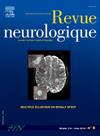帕金森病疼痛管理的非药物干预的有效性和安全性:一项系统综述。
IF 2.8
4区 医学
Q2 CLINICAL NEUROLOGY
引用次数: 0
摘要
慢性疼痛是一种非运动症状,影响60%至80%的帕金森病(PD)患者。PD患者可能会遭受不同类型的疼痛,无论是疾病的特异性还是非特异性,并取决于各种病理生理机制(伤害性、伤害性或神经性),这些机制可能存在于疾病的任何阶段。非药物干预(NPI)对于补充PD疼痛管理中的常规护理干预至关重要。此外,在文献中,已经表明42%的帕金森病患者已经在使用补充疗法。因此,我们的目的是研究NPI在帕金森病疼痛管理中的有效性和安全性。根据系统评价和荟萃分析的首选报告项目(PRISMA)声明进行了系统评价。2004年至2021年间,纳入了18项已发表的随机对照试验(RCT),共有976名帕金森病患者。从中,我们报告了15种不同的NPI,分为七类:体育锻炼、温和疗法、手法疗法、针灸、植物制剂、身体心理实践和多重保护护理。我们的研究结果表明,用于PD疼痛管理的NPI具有低到中等水平的证据,显示出主要有利的结果,即使一些NPI呈现出不确定的结果。此外,我们的综述强调了一些特定NPI在PD疼痛管理中的临床相关性:NPI由主动的身体活动组成,而不是被动的活动。NPI的安全性也得到了证实,因为只有少数轻微的短暂不良事件被报道。然而,即使发现了一些有趣的结果,未来研究的方法也需要更加稳健,并包括全面的描述,以便为临床医生提供可靠和合理的建议。本文章由计算机程序翻译,如有差异,请以英文原文为准。
The effectiveness and safety of non-pharmacological intervention for pain management in Parkinson's disease: A systematic review
Chronic pain is a non-motor symptom affecting from 60 to 80% of patients with Parkinson's disease (PD). PD patients can suffer from different types of pain, either specific or not specific of the disease, and depending on various pathophysiological mechanisms (nociceptive, nociplastic or neuropathic), which can be present at any stage of the disease. Non-pharmacological interventions (NPIs) are essential to complement routine care interventions in PD pain management. Moreover, in the literature, it has been shown that 42% of PD patients are already using complementary therapies. Hence, our aim was to investigate the effectiveness and safety of NPIs for pain management in PD. A systematic review was conducted in accordance with the Preferred Reporting Items for Systematic Reviews and Meta-Analyses (PRISMA) statement. Eighteen published randomized control trials (RCTs) were included between 2004 and 2021 leading to a total of 976 PD patients. From them, we reported fifteen different NPIs classified in seven categories: physical exercises, balneotherapy, manual therapy, acupuncture, botanical preparation, body-psychological practice and multiprotection care. Our results have shown that NPIs for PD pain management had a low-to-moderate level of evidence showing mainly favourable results, even if some NPIs presented inconclusive results. Moreover, our review highlighted the clinical relevance of some specific NPIs in PD pain management: NPIs consisting of active physical activities, opposed to passive activities. The safety of NPIs was also confirmed since only few minor transient adverse events were reported. Nevertheless, even if some interesting results were found, the methodology of future studies needs to be more robust and to include comprehensive descriptions in order to offer reliable and sound recommendations to clinicians.
求助全文
通过发布文献求助,成功后即可免费获取论文全文。
去求助
来源期刊

Revue neurologique
医学-临床神经学
CiteScore
4.80
自引率
0.00%
发文量
598
审稿时长
55 days
期刊介绍:
The first issue of the Revue Neurologique, featuring an original article by Jean-Martin Charcot, was published on February 28th, 1893. Six years later, the French Society of Neurology (SFN) adopted this journal as its official publication in the year of its foundation, 1899.
The Revue Neurologique was published throughout the 20th century without interruption and is indexed in all international databases (including Current Contents, Pubmed, Scopus). Ten annual issues provide original peer-reviewed clinical and research articles, and review articles giving up-to-date insights in all areas of neurology. The Revue Neurologique also publishes guidelines and recommendations.
The Revue Neurologique publishes original articles, brief reports, general reviews, editorials, and letters to the editor as well as correspondence concerning articles previously published in the journal in the correspondence column.
 求助内容:
求助内容: 应助结果提醒方式:
应助结果提醒方式:


